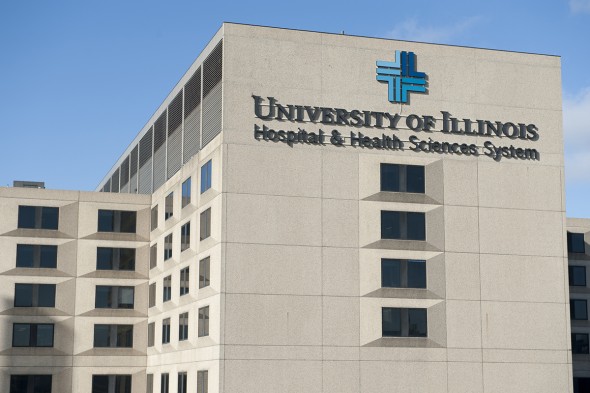Changes in structure, governance ahead for UI Health
 Saying “the status quo is not sustainable from an operational, clinical or financial perspective,” a health care management consultant outlined options for the future of UI Health at a town hall meeting last week.
Saying “the status quo is not sustainable from an operational, clinical or financial perspective,” a health care management consultant outlined options for the future of UI Health at a town hall meeting last week.
Andrew Ziskind, managing director of Huron Consulting Group, spoke to a crowd of more than 200 faculty and staff at the meeting Oct. 1 in Student Center West.
Several months ago, the University of Illinois Board of Trustees hired Huron Consulting to present possible models for structure and governance in keeping with UI Health’s education, research and clinical care missions.
Although no decision has been made, University President Bob Easter told the town hall audience some plans “seem less likely than others.”
The health enterprise was managed within the UIC campus until two years ago, when the position of vice president for health affairs position was created, reporting to the university president.
With the recent departure of Joe G.N. “Skip” Garcia, former vice president for health affairs, the university has an opportunity to examine the current structure and determine if it meets the needs of the university and the communities it serves across the state, Easter said.
Huron Consulting and university leadership interviewed deans, faculty and others over the past several months. The town hall meeting opened the discussion to faculty and staff.
“What we have tried to do throughout this entire process is to create an opportunity for those who are stakeholders, those who have a vested interest in the success of the overall enterprise, to offer their perspectives,” Easter said.
UI Health faces external pressures from health care reform, a highly competitive Chicago market, decreasing reimbursement and a focus on delivering higher quality care at a lower cost, Ziskind said.
“Across the country we’re finding that academic health centers are falling behind their community counterparts in organizing and responding” to changes in the health care environment, he said.
UI Health is no different, he added.
“The last thing you can afford right now is to have a lot of dysfunction internally,” said Ziskind, who listed the health system’s adverse payer mix, aging clinical facilities and organizational transitions as challenges.
“Although things have improved dramatically, the financial and clinical performance still needs to step up a notch,” Ziskind said.
Ziskind presented four organizational and governance models.
The plan in the forefront so far would eliminate the vice president for health affairs role and restore a vice chancellor for health affairs reporting to the chancellor. This person would become a health provost for the health sciences colleges with academic and clinical alignment.
“There seems to be some consensus emerging” for this proposal, said Avijit Ghosh, special adviser to the president, who led the process with Huron and the university.
Other proposals:
• maintain the current organizational structure — a vice president for health affairs who oversees the hospital and clinical delivery system and reports directly to the president. The deans of the health sciences colleges would maintain separate reporting to the chancellor through the provost.
• a vice president for health affairs with centralized oversight of the health enterprise, essentially creating a “virtual” west campus. Health sciences colleges and the clinical enterprise would report to the vice president for health affairs.
• make the dean of the College of Medicine leader of an integrated health enterprise, either as a vice president or vice chancellor for health affairs.
The fourth option was discounted early in the process, Ziskind said.
“We’re concerned that scope would be too broad. And it creates some intrinsic alignment conflict between the other health science colleges and the College of Medicine,” he said.
Although the UIC campus has had a vice chancellor for health affairs before, the latest proposal is different, Ghosh said.
“In the past, the scope of the vice chancellor for health affairs was only over the hospital. With the current proposal, the vice chancellor would have responsibility for both clinical and academic components of the health sciences. The deans of the health sciences colleges would report to this person.
“Although this position is the same in title, the conception is very different,” Ghosh said.
Chancellor Paula Allen-Meares began the discussion portion of the town hall.
“The health sciences enterprise and its clinical activities ought to report to the campus,” she said.
“I’ve experienced the VPHA-model up close and personal. Reporting up to the president, you lose a lot of the synergy and integration between the health sciences and the rest of the campus, meaning the east side.”
Victoria Persky, professor of epidemiology, raised concerns about proposals that might divide the campus.
“If we’re separated more from the east campus than we currently are, that will have a major impact on our academics and our teaching,” she said.
Jerry Bauman, interim vice president for health affairs and dean of the College of Pharmacy, said he has discussed the UI Health proposals with health sciences deans over the past several weeks.
“The consensus among the deans is that we agree with Chancellor Allen-Meares, that this should be placed back under the UIC umbrella,” Bauman said.
“We’re also extremely sensitive to maintaining a sense of community as a comprehensive university.”
